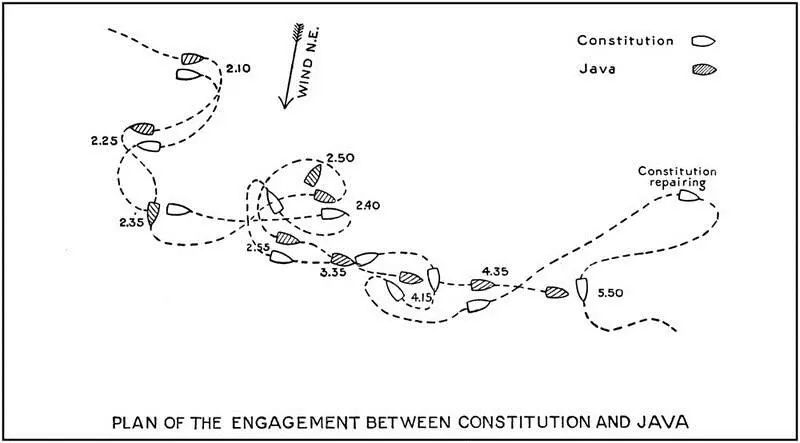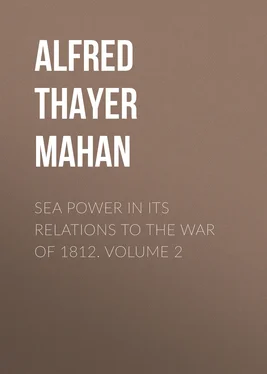Alfred Thayer Mahan - Sea Power in its Relations to the War of 1812. Volume 2
Здесь есть возможность читать онлайн «Alfred Thayer Mahan - Sea Power in its Relations to the War of 1812. Volume 2» — ознакомительный отрывок электронной книги совершенно бесплатно, а после прочтения отрывка купить полную версию. В некоторых случаях можно слушать аудио, скачать через торрент в формате fb2 и присутствует краткое содержание. Жанр: foreign_prose, История, foreign_edu, foreign_antique, на английском языке. Описание произведения, (предисловие) а так же отзывы посетителей доступны на портале библиотеки ЛибКат.
- Название:Sea Power in its Relations to the War of 1812. Volume 2
- Автор:
- Жанр:
- Год:неизвестен
- ISBN:нет данных
- Рейтинг книги:5 / 5. Голосов: 1
-
Избранное:Добавить в избранное
- Отзывы:
-
Ваша оценка:
- 100
- 1
- 2
- 3
- 4
- 5
Sea Power in its Relations to the War of 1812. Volume 2: краткое содержание, описание и аннотация
Предлагаем к чтению аннотацию, описание, краткое содержание или предисловие (зависит от того, что написал сам автор книги «Sea Power in its Relations to the War of 1812. Volume 2»). Если вы не нашли необходимую информацию о книге — напишите в комментариях, мы постараемся отыскать её.
Sea Power in its Relations to the War of 1812. Volume 2 — читать онлайн ознакомительный отрывок
Ниже представлен текст книги, разбитый по страницам. Система сохранения места последней прочитанной страницы, позволяет с удобством читать онлайн бесплатно книгу «Sea Power in its Relations to the War of 1812. Volume 2», без необходимости каждый раз заново искать на чём Вы остановились. Поставьте закладку, и сможете в любой момент перейти на страницу, на которой закончили чтение.
Интервал:
Закладка:
A. T. Mahan
Sea Power in its Relations to the War of 1812 / Volume 2
CHAPTER IX
THE WINTER OF 1812-1813—BAINBRIDGE'S SQUADRON: ACTIONS BETWEEN "CONSTITUTION" AND "JAVA," "HORNET" AND "PEACOCK"—INCREASING PRESSURE ON ATLANTIC COAST
The squadron under Commodore William Bainbridge, the third which sailed from the United States in October, 1812, started nearly three weeks after the joint departure of Rodgers and Decatur. It consisted of the "Constitution" and sloop of war "Hornet," then in Boston, and of the "Essex," the only 32-gun frigate in the navy, fitting for sea in the Delaware. The original armament of the latter, from which she derived her rate, had been changed to forty 32-pounder carronades and six long twelves; total, forty-six guns. It is noticeable that this battery, which ultimately contributed not merely to her capture, but to her almost helplessness under the fire of an enemy able to maintain his distance out of carronade range, was strongly objected to by Captain Porter. On October 14 he applied to be transferred to the "Adams," giving as reasons "my insuperable dislike to carronades, and the bad sailing of the "Essex," which render her, in my opinion, the worst frigate in the service." 1 1 Captains' Letters. Navy Department.
The request was not granted, and Porter sailed in command of the ship on October 28, the two other vessels having left Boston on the 26th.
In order to facilitate a junction, Bainbridge had sent Porter full details of his intended movements. 2 2 Ibid., Bainbridge, Oct. 13, 1812.
A summary of these will show his views as to a well-planned commerce-destroying cruise. Starting about October 25, he would steer first a course not differing greatly from the general direction taken by Rodgers and Decatur, to the Cape Verde Islands, where he would fill with water, and by November 27 sail for the island Fernando de Noronha, two hundred and fifty miles south of the Equator, and two hundred miles from the mainland of Brazil, then a Portuguese colony, of which the island was a dependency. The trade winds being fair for this passage, he hoped to leave there by December 15, and to cruise south along the Brazilian coast as far as Rio de Janeiro, until January 15. In the outcome the meeting of the "Constitution" with the "Java" cut short her proceedings at this point; but Bainbridge had purposed to stay yet another month along the Brazilian coast, between Rio and St. Catherine's, three hundred miles south. Thence he would cross the South Atlantic to the neighborhood of St. Helena, remaining just beyond sight of it, to intercept returning British Indiamen, which frequently stopped there. Porter failed to overtake the other vessels, on account of the bad sailing of the "Essex." He arrived at Fernando de Noronha December 14, one day before that fixed by Bainbridge as his last there; but the "Constitution" and "Hornet" had already gone on to Bahia, on the Brazilian mainland, seven hundred miles to the southwest, leaving a letter for him to proceed off Cape Frio, sixty miles from the entrance of Rio. He reached this rendezvous on the 25th, but saw nothing of Bainbridge, who had been detained off Bahia by conditions there. The result was that the "Essex" never found her consorts, and finally struck out a career for herself, which belongs rather to a subsequent period of the war. We therefore leave her spending her Christmas off Cape Frio.
The two other vessels had arrived off Bahia on December 13. Here was lying a British sloop of war, the "Bonne Citoyenne," understood to have on board a very large amount of specie for England. The American vessels blockaded her for some days, and then Captain Lawrence challenged her to single combat; Bainbridge acquiescing, and pledging his honor that the "Constitution" should remain out of the way, or at least not interfere. The British captain, properly enough, declined. That his ship and her reported value were detaining two American vessels from wider depredations was a reason more important than any fighting-cock glory to be had from an arranged encounter on equal terms, and should have sufficed him without expressing the doubt he did as to Bainbridge's good faith. 3 3 Niles' Register, vol. iv. p. 25.
On the 26th the Commodore, leaving Lawrence alone to watch the British sloop, stood out to sea with the "Constitution," cruising well off shore; and thus on the 29th, at 9 A.M., being then five miles south of the port and some miles from land, discovered two strange sail, which were the British frigate "Java," Captain Henry Lambert, going to Bahia for water, with an American ship, prize to her.
Upon seeing the "Constitution" in the south-southwest, the British captain shaped his course for her, directing the prize to enter the harbor. Bainbridge, watching these movements, now tacked his ship, and at 11.30 A.M. steered away southeast under all plain sail, to draw the enemy well away from neutral waters; the Portuguese authorities having shown some sensitiveness on that score. The "Java" followed, running full ten miles an hour, a great speed in those days, and gaining rapidly. At 1.30, being now as far off shore as desired, Bainbridge went about and stood toward the enemy, who kept away with a view to rake, which the "Constitution" avoided by the usual means of wearing, resuming her course southeast, but under canvas much reduced. At 2.10 the "Java," having closed to a half mile, the "Constitution" fired one gun ahead of her; whereupon the British ship hoisted her colors, and the American then fired two broadsides. The "Java" now took up a position to windward of the "Constitution," on her port side, a little forward (2.10); "within pistol-shot," according to the minutes submitted by the officer who succeeded to the command; "much further than I wished," by Bainbridge's journal. It is not possible entirely to reconcile the pretty full details of further movements given by each; 4 4 Bainbridge's report is in the Captains' Letters. Navy Department, Jan. 3, 1813. It will be found also in Niles' Register, vol. iii. p. 410. Both give extracts from Bainbridge's journal, which is very full on the subject of manœuvres and times. The British account will be found in the Naval Chronicle, vol. xxix. pp. 403-408, from which the plan of the battle is copied.
but it may be said, generally, that this battle was not mainly an artillery duel, like those of the "Constitution" and "Guerrière," the "Wasp" and "Frolic," nor yet one in which a principal manœuvre, by its decisive effect upon the use of artillery, played the determining part, as was the case with the "United States" and "Macedonian." Here it was a combination of the two factors, a succession of evolutions resembling the changes of position, the retreats and advances, of a fencing or boxing match, in which the opponents work round the ring; accompanied by a continual play of the guns, answering to the thrusts and blows of individual encounter. In this game of manœuvres the "Constitution" was somewhat handicapped by her wheel being shot away at 2.30. The rudder remained unharmed; but working a ship by relieving tackles, the substitute for the wheel, is for several reasons neither as quick nor as accurate.

PLAN OF THE ENGAGEMENT BETWEEN CONSTITUTION AND JAVA
Certain salient incidents stand out in both accounts, marking the progress of the engagement. Shortly before three o'clock the head of the "Java's" bowsprit was shot away, and with it went the jib-boom. At this time, the fore and main masts of the British frigate being badly wounded, with all the rigging cut to pieces, Captain Lambert looked upon the day as lost unless he could board.
Читать дальшеИнтервал:
Закладка:
Похожие книги на «Sea Power in its Relations to the War of 1812. Volume 2»
Представляем Вашему вниманию похожие книги на «Sea Power in its Relations to the War of 1812. Volume 2» списком для выбора. Мы отобрали схожую по названию и смыслу литературу в надежде предоставить читателям больше вариантов отыскать новые, интересные, ещё непрочитанные произведения.
Обсуждение, отзывы о книге «Sea Power in its Relations to the War of 1812. Volume 2» и просто собственные мнения читателей. Оставьте ваши комментарии, напишите, что Вы думаете о произведении, его смысле или главных героях. Укажите что конкретно понравилось, а что нет, и почему Вы так считаете.












